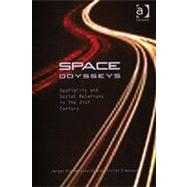Space Odysseys: Spatiality and Social Relations in the 21st Century
, by Bµrenholdt,J°rgen Ole- ISBN: 9780754643494 | 0754643492
- Cover: Hardcover
- Copyright: 12/28/2004
The nature of spatial imaginations has become central to a range of major social and political debates. Narratives on spatial inequality, from the North-South divide in global economic and political visions, to marginalisation and 'ghettoisation' in Western cities, appear regularly in our daily newspapers. Such examples indicate that issues of space/spatiality are as crucial in our current societies as never before.'Space Odysseys' brings together leading social scientists including John Urry and Derek Gregory to address a number of central issues in spatiality and social relations in the early 21st century. Starting from the presupposition that space is a social dimension and a social construct, it then presents examples of these conceptions of space at work. While the book title's indirect reference to the film '2001: A Space Odyssey' indicates the contributors' interest in questions of voyages and mobility, the plural use shows that the approaches to this conceptual exploration are multiple, reflecting differences in experience, in social context and/or in gender, class and ethnicity.The book is divided into three main sections. The first explores issues of 'mobility, immobility and embodied narratives', the second section deals with 'territoriality, mobility and identity politics and the final section concludes with chapters on 'the spatial production of knowledge'.






